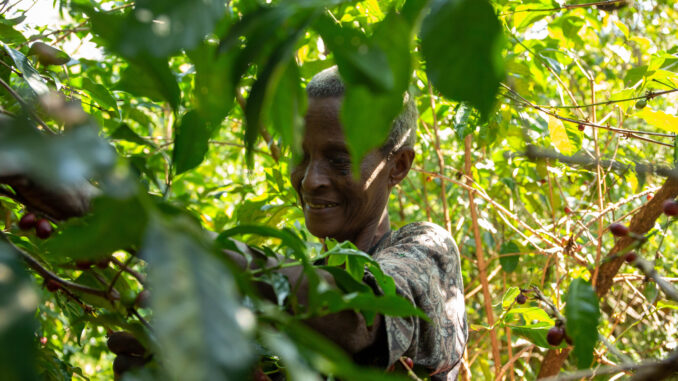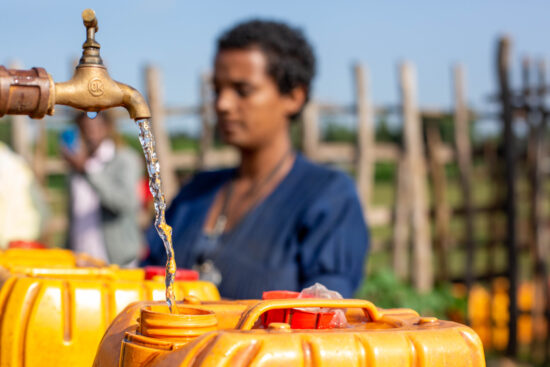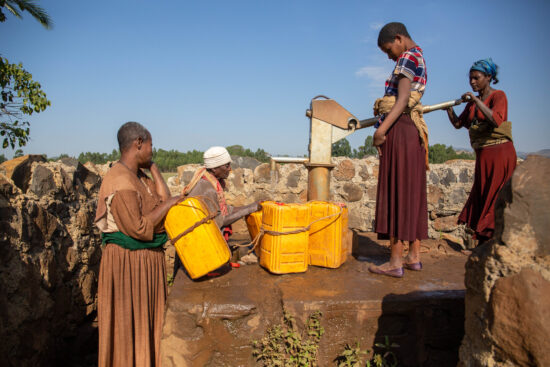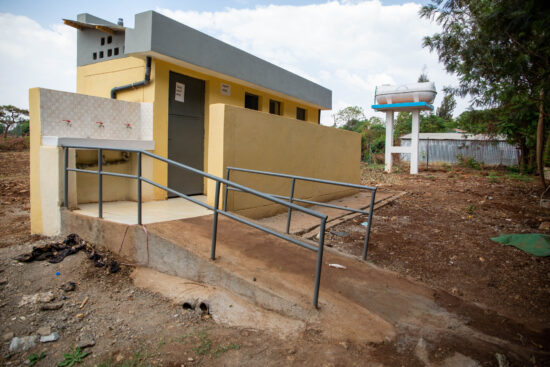
The four-year effort in the Jabi Tehran woreda is bringing clean water and improved sanitation to more than 10,000 people.
BY CHRIS RYAN
BARISTA MAGAZINE ONLINE
Photos courtesy of Project Waterfall
Since 2011, the nonprofit organization Project Waterfall has been following through on its mission to strengthen coffee-growing coffee communities by investing in sustainable clean-water, sanitation, and hygiene projects.
The group’s projects have impacted more than 50,000 coffee growers in Nicaragua, Tanzania, Rwanda, Vietnam, Uganda, Kenya, and Ethiopia, and earlier this year they completed one of their biggest undertakings to date: a four-year project bringing clean water, sanitation, and hygiene to over 10,000 people in Ethiopia’s Jabi Tehnan woreda (a woreda is an administrative district.)

Project Waterfall launched the project in 2018, partnering with the local government and nonprofit organization WaterAid; one of the first tasks was deciding where to carry out the work. “As WaterAid has close connections with communities across the coffee-growing belt, they are in the best position to identify which communities are in need of access to clean water, sanitation, and hygiene facilities,” says Project Waterfall director, Rebecca Hodgson. “They are the experts in this, and we are very fortunate to be partnering with them.”
They decided to execute the work in Jabi Tehnan, a coffee-growing district in the Amhara region with one of the lowest levels of clean water, sanitation, and hygiene practices in the area. Only 67% of the population have access to water, and 50% have access to sanitation, according to Project Waterfall.
During the project, the team at WaterAid Ethiopia kept in close contact with Project Waterfall to update them on the project’s progress—which was particularly volatile because of the COVID-19 pandemic. “The Jabi Tehnan project was in full swing when COVID-19 hit, so the local team had to navigate a global pandemic while trying to keep the project on track,” says Rebecca. “Communication is key—and we pass these updates on to our supporters so everyone is aware of any changes in the project plan or any challenges the community is working to overcome.”

Through this communication and collaboration, the project achieved several goals to improve the Jabi Tehnan woreda, including:
– Improving access to a safe water supply for 10,571 people through two water supply systems that were constructed and handed over to the community, one of which also supplies water to two local schools. The community was involved in the construction work to ensure the system’s sustainability.
– Creating facilities for women and girls, with an inclusive sanitation block constructed at the local high school for 311 female students, which includes a shower, resting area, hand-washing facilities, and a small garden.
– Increasing access to sanitation for 10,662 people, including building two public toilet blocks, shower blocks, and a water kiosk to provide water and sanitary materials to the community, and providing sanitation training to health extension workers and other community leaders.
– Establishing water-supply committees and training for government officials to execute a climate-resilient water plan in the community.

With the new additions in place in Jabi Tehnan, Rebecca says a key complementary piece is achieving buy-in from the community to ensure the pieces are integrated into the community. “Workshops and training are provided to local health professionals and government officials, so that they have a clear understanding of how the water supply system works and to ensure that the community practices good hygiene,” she says. “Children take part in workshops at school all about hygiene, and local people are taught how to build toilets so that more and more families have access to sanitation and hygiene facilities. Although the physical construction of water taps and toilet blocks is important, without education and community ownership, these facilities will over time often become neglected and unusable. Education is everything.”
You can read more about the recently completed Jabi Tehnan project here, and you can visit Project Waterfall’s website to see the additional work the nonprofit does in coffee-growing communities.
“It’s our goal to make access to clean water, sanitation, and hygiene a reality for everyone,” says Rebecca. “We believe that clean drinking water is the first step in breaking the poverty cycle—and supporting coffee-growing communities to make sure they have access to this basic human right is not only the right thing to do, it’s also essential for securing the future of our coffee supply chain.”




